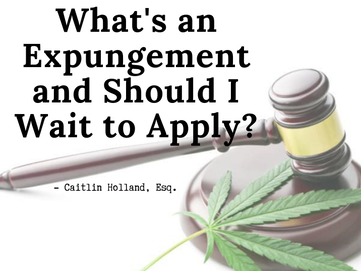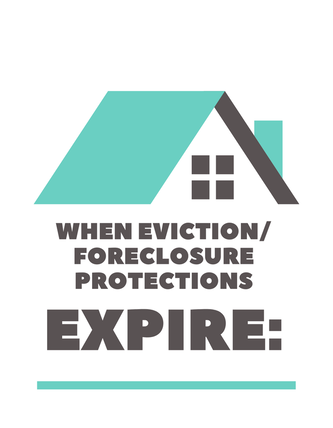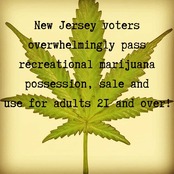 New Jersey residents’ vote to legalize recreational marijuana has many wondering what effect legalization will have on expungements in the state. The question remains unanswered, but marijuana offenses are not the only crimes eligible for expungement. An expungement is “removal and isolation” of your criminal record. Contrary to popular belief, expungements do not clear or erase your record. Rather, they ensure that your record is not generally available or visible to the public. Mistakes happen. Having a criminal record can hinder your everyday life. Even if you were not charged, your arrest will still be visible on your record. Expungements are extremely beneficial to obtain before you submit any application where the reviewer will conduct a background check. These applications include: job applications, professional licenses, college applications, financial aid, and private and public housing. Once expunged, employers, landlords, creditors, etc. will not be able to view your criminal history. Your report will simply state that there is no record. If you are applying to a Federal or law enforcement position, your criminal record will still be visible due to the nature of the employment. Your eligibility to have your criminal record expunged depends on a number of factors, including: the nature of the crime committed; whether an arrest resulted in a conviction; the time passed since the disposition of the offense; and whether any fines have been paid in full. Effective June 2020, you may apply for a “clean slate” expungement 10 years after your most recent conviction, payment of fine, satisfactory completion of probation or parole, or release from prison. There are crimes that cannot be expunged such as driving under the influence of alcohol or drugs, robbery, sexual assault, perjury, etc. If you have any convictions for offenses that cannot be expunged, you will not be eligible for a “clean slate” expungement. During the pandemic, the complete expungement process can take anywhere from three months to nine months due to delays in state offices. If you are planning on submitting any applications in the near future, you should consider petitioning for an expungement soon. If you have a marijuana conviction and you are waiting to see what happens with the legalization of recreational marijuana in NJ, you may be waiting a long time. On January 1, 2021, recreation marijuana was slated to be legalized in the State of New Jersey. However, the state legislature is effectively at a standstill with negotiations crumbling in Trenton. [1] At this point, recreational marijuana is still illegal in New Jersey and the Attorney General’s adjournment of marijuana convictions expires on January 25, 2021. With no updates from the Attorney General since November 25, 2020[2], legalization is in limbo and its effect on expungements is still unclear. Don’t wait to apply for an expungement. Schedule a meeting with us today to determine your eligibility! By Caitlin Holland, Esquire
0 Comments
 The fact that the real estate market thrived during 2020 while the global economy crumbled is well-documented. Analytics compiled by New Jersey Realtors® show the real estate market outperformed the 2019 year, despite a slump in activity in the spring presumably due to New Jersey lockdown restrictions.[1] The data also shows a reduction in listings, meaning the supply of available property was less this year than last. Many real estate professionals were caught off guard with the sudden influx of activity. News headlines showed record breaking numbers of Americans filing for unemployment. Businesses were forced to close. Some temporarily. Some for good. Many businesses could, and are still, only operating at partial capacity to ensure patron and employee safety, and to allow proper compliance with CDC cleaning protocols. How did the real estate industry manage to emerge from the global economic downturn unscathed? It all started with immediate action from Congress. Shocking, I know! Eviction moratoriums were put in place in the early spring when the pandemic was finally recognized as a threat by the United States. The CDC enacted similar protections. Congress also enacted a temporary freeze on foreclosures and mortgage forbearance. Then, the Federal Reserve lowered rates to 0% to 0.25%, an attempt to protect the home buying market. This resulted in a decrease in mortgage rates. Fixed mortgage rates dropped below 3% causing a rush of home buying and refinancing and making it the lowest mortgage rate on record. The realties of lockdown also fueled real estate market trends. Many people became remote workers, operating out of make-shift home offices. Forced with the realization they will be spending more time at home (with their spouses and children) than ever before, many left small apartments in big cities for larger properties in the suburbs. Properties that often come with outdoor space. Purchasers requested properties with home offices, gym, and other “flex rooms”. It’s not difficult to make the logical conclusion these requests are in direct response to the new normal of pandemic life.[2] Metropolitan areas around the country are experiencing a quite different reality. New York City is enduring an unprecedented fall in residential real estate. Between the month of March through November, rents in Manhattan dropped 12.7%, exceeding the biggest price drop during the Great Recession.[3] But what is going to happen when the multitude of state and federal eviction and foreclosure protections are eventually lifted? I believe the market’s low inventory is related in part to these protections. Landlords voiced opposition to the moratoriums, labeling them as an “unlawful taking” in court, sometimes successfully circumventing eviction protections.[4] When the protections expire, these vacant properties will immediately hit a market with hungry buyers starving for supply, and there will be an influx in bargain-basement real estate purchasing, for those who can afford it. 12/23/2020 Refinancing? You May Be Subject To The New “Adverse Market Fee”. The Reason For The Fee May Shock YouRead Now A recent change in Fannie Mae and Freddie Mac backed refinances subtly underscores an impending crisis that is not garnering much attention from the national media. Most refinanced loans closed on or after December 1st and subsequently sold to Fannie and Freddie will be subject to a 0.5% “adverse market fee”.[1] Whether those costs are passed onto the consumer, absorbed by the lender, or some combination therein is at the discretion of the lender. However, the reason for the fee signals a national housing crisis set to materialize in the not-to-distant future. Amongst the backdrop of headlines of Presidential pardons and surging COVID-19 statistics is the very real fact millions of Americans are facing an imminent threat of homelessness. Currently, there are federal restrictions prohibiting landlords from evicting tenants that are unable to pay rent due to COVID-19. Those protections started with the passage of the CARES Act. Federal protections were extended by an order from the Center for Disease Control and Prevention and were set to expire on December 31, 2020.[2] The enactment of the recent $900 billion pandemic relief bill will extend federal protections until the end of January 2021. While many states and localities have their own restrictions on evictions and foreclosures, the recent relief bill is the only federal protection extending into the new year. These moratoriums are not permanent. Tens of millions of people may lose their homes when these temporary safeguards are eventually removed.[3] And eventually, the safeguards will be removed. How is this related to the adverse market fee? The Federal Housing Finance Authority (“FHFA”) anticipates at least $6 billion in losses incurred to protect the American public from forbearance defaults and other moratorium-related losses enacted due to COVID-19.[4] This loss is generally viewed as a conservative estimate. The implementation of the adverse market fee is to help make up for this multi-billion-dollar loss. FHFA decided to implement the adverse market fee on refinances of most loans over $125,000.00, stating in relevant part: [The adverse market fee] will exempt refinance loans with loan balances below $125,000, nearly half of which are comprised of lower income borrowers at or below 80% of area median income. Affordable refinance products, Home Ready and Home Possible, are also exempt[5] FHFA declined to implement the fee on home purchase loans to prevent any negative impact on the housing market, during a time when the economy is already facing serious challenges. This hasn’t stopped real estate and lending groups from decrying the fee, with some groups estimating it will increase costs $1,400.00 on average: "This announcement is bad for our nation's homeowners and the nascent economic recovery. We strongly urge FHFA, which had to approve this policy, to withdraw this ill-timed, misguided directive."[6] We are in unchartered waters when it comes to life post-COVID-19, and if this is one way to help prevent homelessness and another housing collapse, isn’t that a net-positive for homeowners? Or perhaps, is this yet another way the government is passing on the burden of a bail out to middleclass America? After all, we’re all living in a time when the stock market is regularly hitting record highs, while food insecurity statistics continue to rise. by- Ryan Westerman, Esq. [1] https://www.fhfa.gov/Media/PublicAffairs/Pages/Adverse-Market-Refinance-Fee-Implementation-Now-December-1.aspx [2] https://www.cdc.gov/coronavirus/2019-ncov/downloads/eviction-moratoria-order-faqs.pdf [3] https://www.vox.com/21569601/eviction-moratorium-cdc-covid-19-congress-rental-assistance-rent-crisis [4] https://www.marketwatch.com/story/fannie-mae-freddie-mac-will-delay-controversial-refinance-fee-2020-08-25 [5] https://www.fhfa.gov/Media/PublicAffairs/Pages/Adverse-Market-Refinance-Fee-Implementation-Now-December-1.aspx [6] https://www.mba.org/2020-press-releases/august/mba-statement-on-the-gses-adverse-market-refinance-fee  On November 3, 2020, residents of the State of New Jersey voted in an overwhelming majority to legalize recreational marijuana. However, the legislative process has been delayed due to arguments between state legislators regarding how to best implement the changes to state law. A final vote on implementation is set to be heard in Trenton on December 17, 2020. On November 4, 2020, the Attorney General of New Jersey, Gurbir S. Grewal, released a statement reminding New Jersey residents that, “[a]ll of the State’s criminal laws relating to marijuana continue to apply until, among other things, the Legislature enacts a law creating [a] regulatory scheme for legal cannabis.” [1] Then on November 25, 2020, Attorney General Grewal provided additional guidance to state prosecutors concerning the prosecution of low-level marijuana cases. The Attorney General directed “all New Jersey municipal, county, and state prosecutors to adjourn, until at least January 25, 20201, any juvenile or adult case solely involving” particular low-level marijuana crimes.[2] Notably absent from this directive is guidance regarding the prosecution of cases charging the distribution of marijuana or possession of marijuana with the intent to distribute. In his November 25, 2020 guidance, the Attorney General assured residents that “more comprehensive guidance, including direction on handling previously adjudicated matters, will follow when the Legislature provides details of the framework for marijuana decriminalization and the legislation of adult-use cannabis.” At this point, there is no effective date for when possession of marijuana will be decriminalized in New Jersey. What does all of this mean for you? In short, the police can arrest you and prosecutors have the option to charge you for low-level marijuana related offenses, at their discretion, in New Jersey. Distribution or possession with the intent to distribute are still being prosecuted and are not being postponed, according to the Attorney General’s latest guidance. The good news is, if you already made a mistake and have a marijuana-related arrest on your record, you may be able to have that criminal history expunged. Expungement is the legal process by which your criminal record is sealed, with few exceptions. Expungement of your criminal record is beneficial for job applications, federal funding such as loans and grants, housing applications, or any other situation where someone will be conducting a background check. Do you have a marijuana arrest or charge on your record? Contact the Hunnell Law Group for a free case assessment today to determine whether you are eligible for an expungement! Written by Caitlin Holland, Esq. |
Details
Contributors:Stephanie Hunnell, Esq. , Ryan Westerman, Esq. and Caitlin Holland, Esq. Archives
April 2024
Categories
All
|
|
Hunnell Law Group, LLC is conveniently located at 908 Main Street., Asbury Park, NJ 07712
You can contact us at 732-749-3500 or by facsimile at 732-749-3503 Attorneys serving Asbury Park, Avon-by-the-Sea, Belmar, Manasquan, Bradley Beach, Freehold, Toms River, Fair Haven, Red Bank, Manalapan, Marlboro, New Brunswick, Jackson Township, Brick, Howell, Asbury Park, Ocean Township, Eatontown, Wall Township, Neptune City, Neptune Township, Spring Lake, Wanamassa, Lake Como,
Monmouth County, Ocean County, Middlesex County, and Mercer County, in Central New Jersey. |
© 2019, 2020, 2021, 2022, 2023 Hunnell Law Group, LLC, all rights reserved. Disclaimer & Site Map & Privacy Policy.
No aspect of this advertisement has been approved by the Supreme Court of New Jersey.

 RSS Feed
RSS Feed